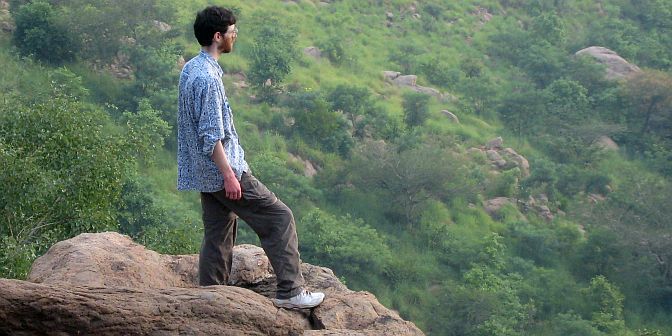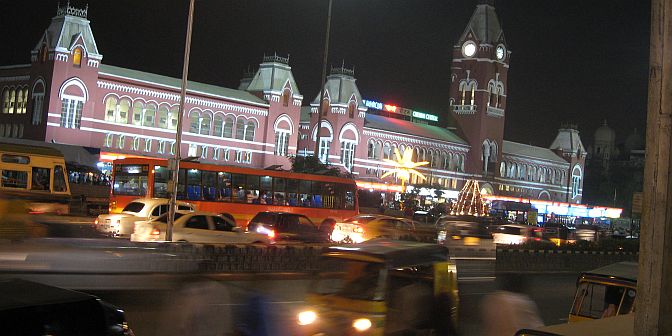Questions on return and listing what I missed, monochrome adjustments and memories; Christchurch collapsing, mountain meditations, and living the feast of grace.
After an 11-hour flight from Bangkok, I stepped off the plane in Auckland on Saturday afternoon, 8 December. I had 20-30 new books (depending on how you classify books versus booklets) in my case and a shoulder bag of wooden Christmas presents. None caused any problem at immigration, though should I have ticked “been on a farm” on the border control form of the NZ Ministry of Agriculture & Fisheries? As Mark Twain said, “India is one vast farm” and I dodged goats and cows most days. As we drove home I noticed how rigidly conservative New Zealanders are compared to liberated Indian society: everyone here religiously follows those ornamental markings on the road.
I’ve heard that reverse culture shock when you come back home is often harder than the first culture shock of travel. Some of the American students from St Olaf College dreaded being asked on return how their trip was. How to compress the physical and spiritual journey, the multi-month barrage of experience and emotion – I filled several pages in my diary every night – to a 30-second sound bite for a non-travelling socialite? Perhaps this is why, though on a humbler scale, those who see mystical visions are often left speechless and silent.
The St Olaf Orientation Handbook (aka “the blue folder”) had some good questions for “a thoughtful return”: How have I changed? What am I most or least looking forward to? What lessons have I learned I never want to forget? What will I do with the experiences I’ve had? Or will we return to our comfy homes, as one student gloomily predicted, and our lives will be no different? After returning to the States, one girl was scared at how little she seemed to have changed on the outside, although she felt different inside.
So what have I noticed or thought about in my first weeks back? I began with a list of things to take next time:
- sellotape to repair much-used maps.
- cotton wool to plug ears on the street, as do many locals.
- a smaller face mask covering just my nose, to be cooler and permit smiling.
- talcum powder for itchy sweaty skin.
- a bigger camera memory-card.
- NZ coins and photos of home to show kids.
- cards with NZ scenery for thank-you notes.
- a small AM radio for English news or info – India didn’t have many FM stations.
And here are some things that I wished I could have taken, or what I missed about NZ while I was away:
- wandering barefoot to our local dairy to buy a loaf of bread.
- walking down the road without constant assault from beggars, hawkers and auto-rickshaw drivers.
- breathing fresh air, without stinging eyes.
- turning on the tap for drinking water, or accepting a glass without anxiety.
- fresh salad sandwiches for lunch, unlike the high-fat, low-fibre Indian diet.
- performing daily tasks without conscious effort, like catching the bus to work.
- infrastructure that works: switching on a light, lifting the phone, withdrawing cash from an ATM.
- communicating in English.
- friends and family.
- solitude and quiet.
- my own functional office computer.
- the efficient, well-stocked uni library: so many more books I want to read! For a start, to help make sense of it all, I’ve taken out Edward Luce’s In Spite of the Gods: the Strange Rise of Modern India (2006).
- jogging through bush tracks in the Auckland Domain or along the waterfront.
On one of my first homecoming runs grey-green waves were blown against the black rocks and Pohutukawa trees were bursting into red blossom. It is also called the Christmas tree, which reminded me that it was nearly the biggest event of the Western year. I noticed I’d not noticed many decorations or much of a festive feel. I took a closer conscious look as I pounded by and perceived some skinny strands of faded tinsel hanging like stray cobwebs in most shop windows. A few artificial trees had a tired glimmer.
But where was the colour? Where were the flowers? Where were the banana leaves and chunky garlands on passing vehicles? The drumming and firecrackers like cannons? India’s assault on the senses has raised my sensory threshold: words like “colourful” now seem bleached of meaning in Auckland’s muted monotone. A friend who has just returned from the Chinese winter had the opposite impression, and commented how colourful New Zealand seemed.
When singing carols on the steps of my church, the Auckland Baptist Tabernacle, I remembered choirs in Chennai singing the same songs (see here). The Tabernacle runs a Christmas display which many school children visit. On the “Bethlehem Street”, sacks bulging with white rice and red barley took me back to Indian markets – until I saw the cardboard to which thin layers of beans were glued. And I’ve now seen Nativity-like scenes for real: families living alongside cattle and goats in shacks like a farmyard barn.
At communion I caught myself reaching for the bread with both hands, forgot that I had left India, and tore off a portion with my right hand alone, making a mess of the crusty loaf (bracing with my middle finger left a deep hole) and bemusing my neighbour. Around the corner from church, the New Age “Third Eye” shop sells incense, devotional articles, and Indian idols – I can now identify many more.
As usual, I spent Christmas in my mother’s birthplace of Christchurch, a city of about 300,000. In the taxi from the airport, we passed elderly residents weeding and watering their gardens. Christchurch is known as the Garden City, and I’ve often thought that it would be a pleasant spot to retire – a “Pensioners’ Paradise” one might say. Both epithets were applied to Bangalore a decade or two ago. What if Microsoft were to move a head office to Christchurch and one third of a million people were pumped into the city every year – as Bangalore has experienced? Where would Christchurch be in a decade? I imagined a Bangalorean scene of gridlocked roads, crumbling infrastructure, and the few remaining flower beds wreathed in smog.
From Christchurch I headed West up to Arthurs Pass National Park for a few days of tramping. I hoped my fitness would be okay: I’d had little formal exercise the last months. But traversing the refuse and rubble of Indian footpaths in the smog was like tramping in low-oxygen conditions! The tiring journey between sheltered compounds or air-con interiors in India resembles a hike through rugged terrain and rough weather between the refuges of tramping huts. I loved the solitude and clean mountain air, though some Indian reflexes continued: I felt a little nervous at eating from wet dishes.
The handclapping experiment at the Art of Living centre (see here) and the Indian emphasis on meditation has shown me again that I’m seldom if ever conscious or present or awake. Trying to be mindful, I sat and contemplated a mountain stream. Through the ever-changing surface, long ripples swaying like a veil, I glimpsed tranquil pebbles on the bottom, like the timeless reality behind the tumultuous mask of maya. In places the water flowed deep and serene, at others it chattered with joy as it bubbled and splashed around rocks in its path. Why so content? Why so cheerful? I asked myself where it was going and the answer came, namely, the sea. In my reverie I had stumbled on a great image of the mystical goal: to merge with the eternal One like a stream in the ocean. Perhaps the sages of India, meditating alone in the forest or by a holy river, came to this illumination in much the same way.
I have heard it said that there are two ways to view life: as a fortress or as a feast. You can operate by tight control, or accept whatever comes as a gift of grace. India teaches you to enjoy life’s banquet. You can’t precisely control the day’s schedule; you rarely know what’s going on. You have to rely on the grace of God and the generosity of people, such as friendly locals who communicate your destination to an English-less auto driver, or direct you to the right bus and where to get off. Every day I would sally forth, not knowing what adventures I would find or people I would meet. You need to balance scepticism of smooth-talking cons with openness to genuine hospitality, the wariness of a sceptic with the wonder of a child – in the words of a Jewish guru, being wise as a serpent yet innocent as a dove.
India is dirty, chaotic, confusing and exhausting. But it is also alive. The West, by contrast, can be quite sterile – physically and socially. Where life is safe and under control, you are less open to grace; when our hands are full, it’s hard to receive life’s unexpected gifts.
One great gift has been the many prayers, emails and encouragements I’ve received while away. I’ve survived the Indian adventure! My malarial medication continues for another week – 30-days post-travel – but the life-broadening effects of this trip will ripple on much further into the New Year.
20 years from now you will be more disappointed by the things you didn’t do than by the ones you did do. So throw off the bowlines. Sail away from the safe harbour. Catch the trade winds in your sails. Explore. Dream. Discover.
Mark Twain (or not), in the St Olaf Global Orientation Handbook

